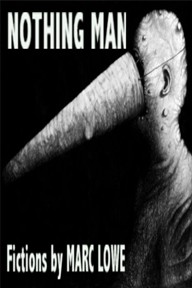Marc Lowe's striking collection of short stories opens with a piece about a man who finds himself under the scrutiny of an eyeball. This unsettling occurrence leads into a series of stories about characters who inexplicably begin to lose key parts of their anatomy. The protagonist of 'The Man without a Mouth' could be the same man as in the first story, continuing the same existence but Lowe contrives to develop his narratives in such a way that the repetition of themes never seems overdone.
The story 'Exhaustion' begins in typical fashion:
Having lugged around his bag full of books all day, Jack's arm fell off. He did
not notice it until he reached home, some thirty minutes later, but by then it
was too late, for he had lost the arm and was too exhausted to go back and
find it.
'Nothing Man' plays with the ideas of identity, consciousness and alienation. The author constantly elaborates on these themes, pushing the boundaries of narrative and character.
In the story 'Breathing', a woman in a meditation class seems on the verge of gaining self-awareness only to realise as she leaves the class that the instructor is laughing at her. The woman's striving towards some kind of consciousness in 'Breathing' is reflected in several of the other pieces whose characters search leads only to the dead end realisation that they are trapped by circumstances, fated to live out their meaningless lives.
In another story a female author divides, amoeba-like, to find herself confronted by her double who proceeds to take over her life and, by implication her very consciousness. 'Skin' features a man who attempts to peel off his skin. A story that might be expected to stretch the boundaries of credibility becomes in Marc Lowe's hands, a poignant reflection of man's search for identity, a realisation of his own biological constraints and ultimately the realisation that to exist is to suffer. The collection is full of these philosophical doors into nothingness.
Lowe has a highly mobile approach to character and plot - stories change pace abruptly and characters move from certainty to deep insecurity in a moment, passionate love transforms into passionate hatred and vice versa - quite a bit like real life - for those of us who accept its changeable nature. 'Murder - a love story' begins with a banal-seeming murder which turns into a love scene and back again.
She does it with a knife. In the back. He slumps over, blood spilling onto the
floor. Typical murder scene. Except for one thing. He is not dead. He turns
around, wrestles the knife out of her hand, stabs her in the right breast. She
slumps over, blood staining her blouse. But she isn't dead either.
The writing is plain, unembellished with troublesome adjectives. The characters in these stories share an angst-ridden approach to life, a joyless anticipation of work, relationships, sex - everything that might be considered life-affirming. And yet there is a humour, an intelligence, a certain sly twisting of conventional authorial technique that makes these stories compelling.
A number of pieces refer to the act of reading or writing. The characters in these stories are engaged in the tasks of writing, reading or academic research only to discover that the task has mutated and turned their reality on its head. In one story a woman finds that she has become a protagonist in her own novel.
Towards its end, the stories in 'Nothing Man' become bleaker and darker, exploring themes of mental illness and sexual dysfunction. The characters seem to be trapped in their roles, half aware and yet unable to break out of the cycles they inhabit. 'Seven Grotesques' reflects this cyclical process in a series of dark vignettes. These pieces have the flavour of modern day myths in which the characters are locked in a struggle with their own destiny, a struggle which is never resolved.
The pieces that make up this collection are powerfully rooted in the world of the everyday, they take place in familiar environments: in the office, the street, a seedy bar, or a hospital ward. But the settings are unidentifiable. That office or street could be in just about any urban setting just about anywhere in the world over the last century or so. It's as if the eponymous Nothing Man inhabits a shadowy nowhere, or rather anywhere. At times we seem to be in a dark European city, at times in the American mid-west. But whatever the setting, Marc Lowe creates troubling stories of human suffering, leavened by dark comedy.
~ Nick Jackson is the author of 'The Secret Life of the Panda', Chomu Press, 2012




